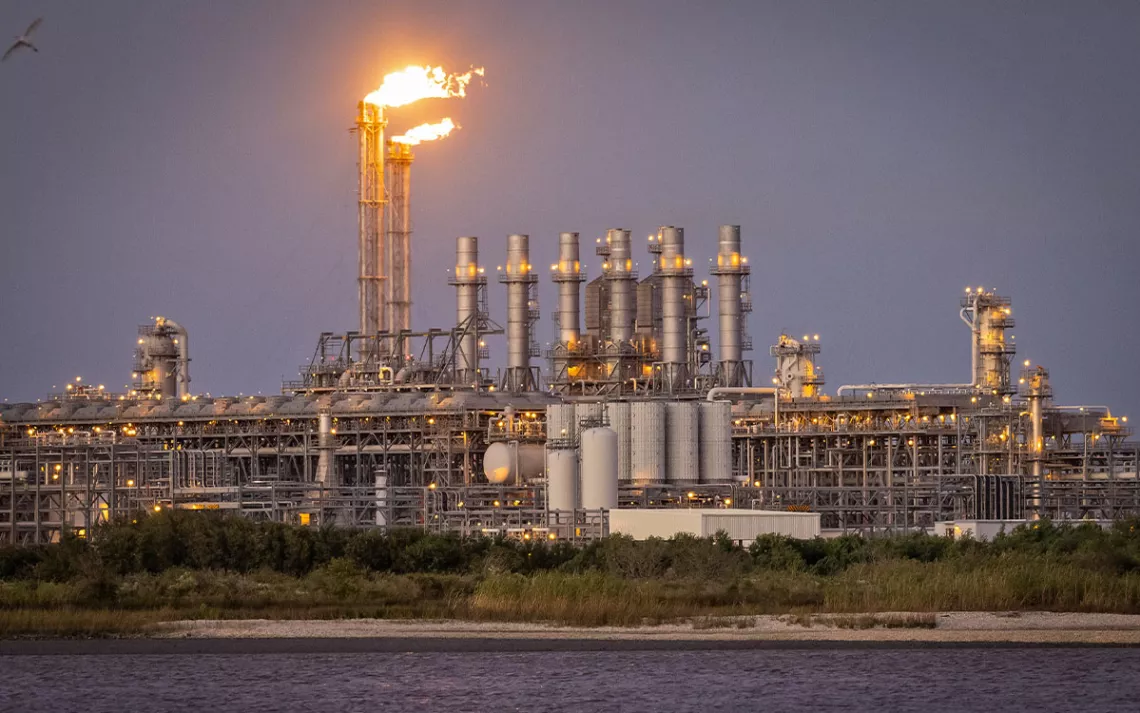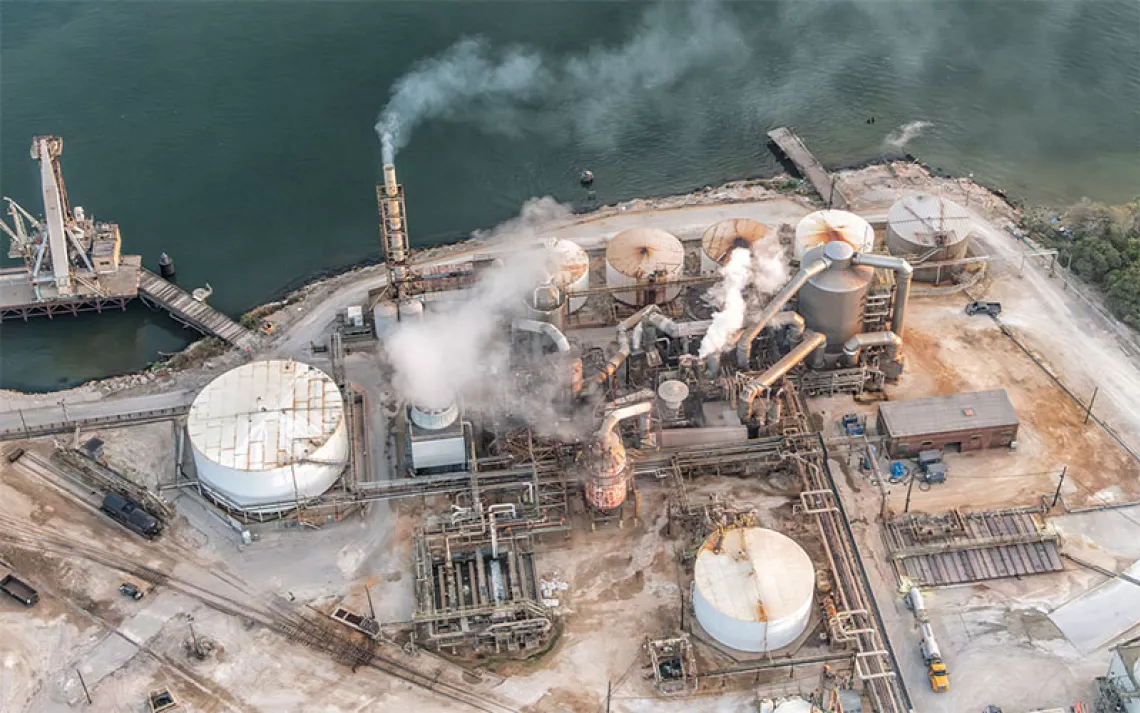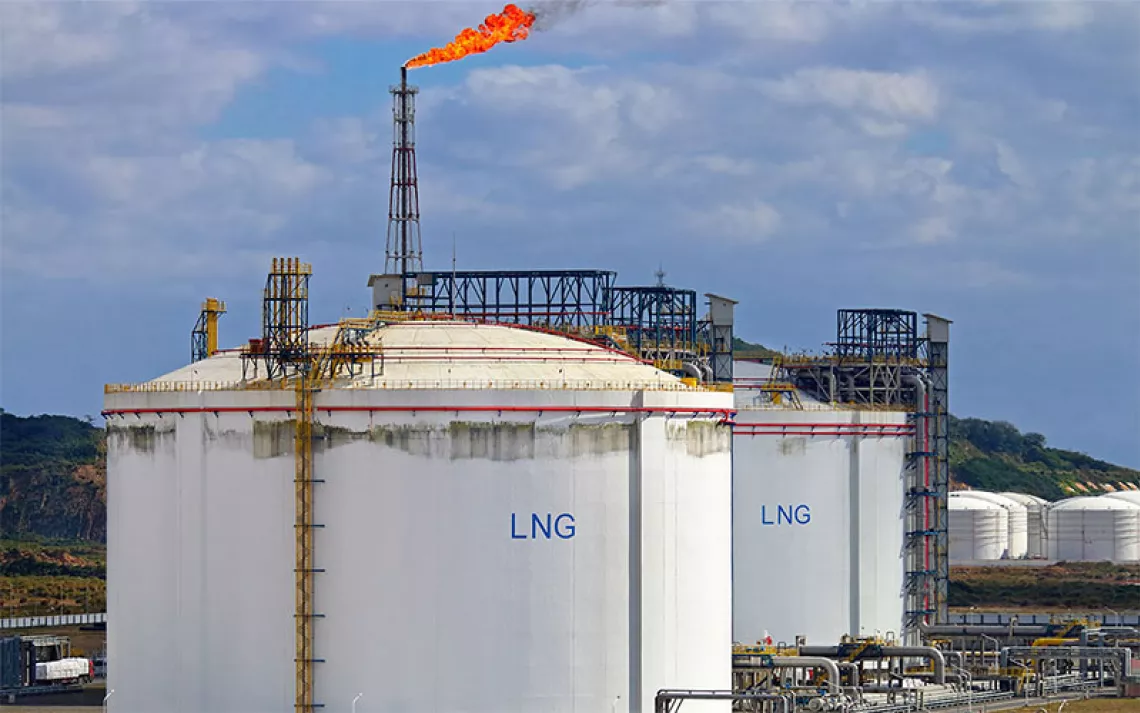Biden Administration: No New LNG Export Terminals
The White House calls a pause until the climate threat of methane gas is fully evaluated

The Calcasieu Pass LNG terminal in Cameron Parish, Louisiana. A proposed, even larger sister plant, CP2, is now on indefinite hold. | Photo by Julie Dermansky
New liquefied natural gas (LNG) export terminals are on hold, thanks to an early morning announcement January 26 from the White House. The Biden administration announced that it is pausing decisions on all new LNG export terminals until the US Department of Energy updates its analysis of the projects to include their climate-warming emissions and economic impacts.
“We will heed the calls of young people and frontline communities who are using their voices to demand action from those with the power to act,” said President Biden in a statement.
“Today, we have an evolving understanding of the market need for LNG, the long-term supply of LNG, and the perilous impacts of methane on our planet,” the White House expanded. “We also must adequately guard against risks to the health of our communities, especially frontline communities in the United States who disproportionately shoulder the burden of pollution from new export facilities.”
Climate and environmental justice activists are celebrating a huge win, one that could affect this November’s presidential election.
“This an amazing moment for frontline communities like mine,” said Roishetta Ozane, a resident and activist from southwest Louisiana. The pause, she said, “is a significant milestone and sets the stage for potential rejection and slows down the progress of these projects, making it much harder for them to secure financing.”
The surprise move puts the brakes on 12 proposed LNG facilities, including Calcasieu Pass LNG, an enormous, 1000-acre project proposed for the Calcasieu Ship Channel in Cameron Parish, Louisiana. The CP2 project has been vehemently opposed by climate activists and residents of the frontline community who are already suffering the effects of several other terminals and refineries in the heavily industrialized area.
The Department of Energy has never rejected an application for an LNG export terminal. Now, the agency is being directed to consider all of the greenhouse gas emissions associated with these projects, including those created during extraction, transmission, liquefaction, and transportation overseas.
Thanks to the fracking boom, the US has become the leading exporter of LNG. The methane gas is transmitted from fracking fields to liquefaction facilities, where it is super-cooled into liquid form for transport in tankers overseas. The country’s first export terminal, Sabine Pass, came online in 2016; there are now seven active terminals, with five more under construction, most of them in Texas and Louisiana.
“At a moment where there have been record exports, it is driving up our energy costs here at home in addition to polluting communities and making the climate crisis worse,” says Cathy Collentine, director of Sierra Club’s Dirty Fuels campaign.
Once the terminals that have already been approved are built, the volume of LNG exported every day will double. But limiting new terminals is crucial to limiting climate disaster: CP2 alone would have increased LNG exports by 20 percent.
Under the new system, CP2 and other export terminals must be approved by both the US Department of Energy and the Federal Energy Regulatory Commission. The DOE is charged with evaluating whether such projects are consistent with the “public interest” before approving export licenses. The agency hasn’t updated its public interest assessment since 1984, before the risks of climate change were widely known.
Since 2013, Sierra Club and other environmental groups have petitioned the agency to revise its policy guidelines for evaluating LNG terminals, which were originally developed to receive gas imports. DOE has consistently denied their petition, most recently last summer.
LNG is mostly methane, a potent greenhouse gas. Though methane burns cleaner than coal, the life-cycle emissions created during extraction, transportation to the LNG facility, liquefaction, and transportation overseas can boost its cumulative impact as high or higher than coal. Methane operations are notoriously leaky, and one analysis shows that total leakage greater than 0.2 percent gives gas a worse climate impact than coal.
More immediately, LNG export facilities expose nearby residents to noise and harmful pollutants. Cameron Parish is home to three LNG export facilities, with three more under construction, and even more—including the massive CP2—in the planning stage. Instagram posts from For a Better Bayou vividly show how flaring from the many facilities have turned Lake Charles, Louisiana, into an apocalyptic “hellscape.” Shrimp numbers in the once-productive fisheries have plummeted. Ozane, a mother of six, sees the effects firsthand in her children, who suffer from skin conditions and asthma. “Living in a community that smells like rotten eggs and chemicals, I know that these facilities are not in the public interest,” she said.
The White House announcement is the direct result of relentless grassroots pressure from frontline activists like Ozane who are part of a broad coalition that includes environmental-justice and climate-focused organizations, along with scientists, economists, and allies in Europe who are working to halt imports of LNG into their countries. Congressional allies include Senator Jeff Merkley (D-OR), who together with 60 colleagues urged the DOE to update its public interest determination for new LNG export facilities.
Ozane says she saw the tide begin to turn after Energy Secretary Jennifer Granholm visited Louisiana and heard community concerns. “They toured our community; they listened to us and said enough is enough,” said Ozane.
This announcement represents the largest single action any president has ever taken to curb fossil fuels. The new criteria will apply to all 12 proposed LNG terminals that have not yet been approved. It will not apply to those under construction or that have already received permits. The pause will likely stall decisions by the DOE from several months to over a year. Once the agency develops new guidelines, the public will have a chance to weigh in. Activists are urging supporters to keep up the pressure.
“We’re glad to know that President Biden and Energy Secretary Granholm are finally listening to us and taking action to protect Louisiana fishermen,” said Travis Dardar, an Indigenous fisherman and activist from Cameron Parish, in a press call Friday morning. But “the thing about a pause ... it can be unpaused at any time.”
Activists, including Ozane and dozens of senior citizens from Bill McKibben’s Third Act organization have cancelled a sit-in planned for Washington, DC, next month; instead, they are directing their energies to the coming public comment period.
As McKibben pointed out in his Substack newsletter, The Crucial Years, Biden’s announcement doesn’t guarantee that new LNG terminals will be stopped for good. But it “sets up a process where victory is possible.”
The White House directive also changes the flavor of the 2024 presidential election, potentially making it into an existential fight for the future health of the planet.
“I think this will galvanize environmental voters old and young,” McKibben told Sierra in an email. “Biden can now claim to have done more to both boost clean energy and block dirty energy than any president before him. His record, obviously, isn't perfect—but that's a potent and accurate boast to be able to make.”
The announcement, leaked by The New York Times on Thursday, immediately sent Republicans and the fossil fuel industry into a lather.
“@POTUS’ deference to climate extremists continues to sell out American consumers and US allies,” Senate Minority Leader Mitch McConnell tweeted on Thursday. “Greater reliance on dirty energy from Russia or Iran is never in the national interest,”
If Biden doesn’t win reelection in November, this opportunity to check dirty fossil fuel goes out the window, said McKibben.
Nikki Haley has made it clear that she would support the continued build-out of LNG export terminals, he warned, and Trump, said McKibben, would “happily build an energy export terminal in the West Wing and back tankers up the Potomac.”
Even as activists celebrate, they are clear about their goals: They don’t want to simply stop new proposals, but roll back the active export terminals and those under construction, which have locked us into emissions that will make it very hard to stay below the 1.5°C warming threshold that experts warn could catalyze catastrophic changes across the globe. And in an election year where some warn our very democracy is on the line, the Biden administration announcement has turned up the heat on voters.
 The Magazine of The Sierra Club
The Magazine of The Sierra Club



